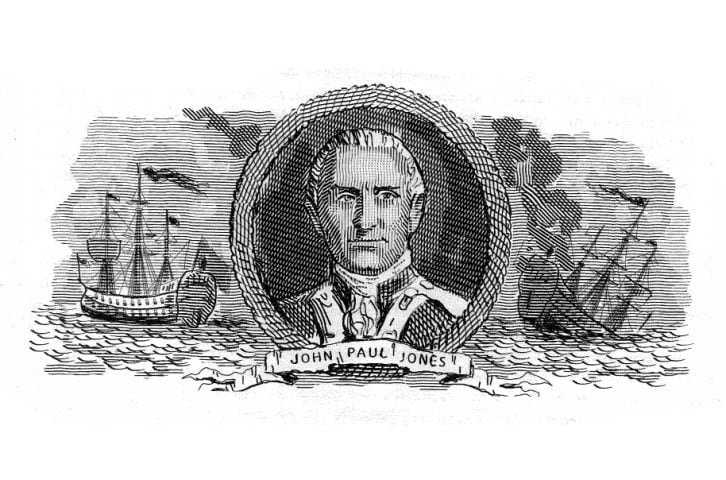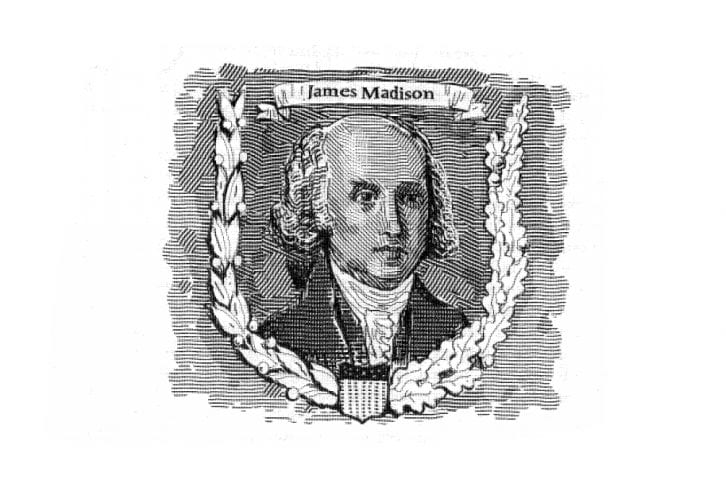Books Reviewed
A review of John Paul Jones: Sailor, Hero, Father of the American Navy by Evan Thomas
Every officer in our navy should know by heart the deeds of John Paul Jones," declared President Theodore Roosevelt. As part of his plan to fashion the United States into a world maritime power, T.R. needed a hero for his new navy. He found, or rather, resurrected, such a hero in the Continental Navy's John Paul Jones. And so the body of the man known to the British as the "Pirate Paul Jones" was brought from Paris, where it had lain since his lonely death there in 1792, to the Naval Academy Chapel in Annapolis, where Jones's body was placed in a marble sarcophagus modeled on Napoleon's own tomb. Thus was laid to rest the man Thomas Jefferson once described as "the principal hope of America's future efforts on the ocean."
In his John Paul Jones: Sailor, Hero, Father of the American Navy, Evan Thomas, assistant managing editor at Newsweek and author of, among other works, Robert Kennedy: His Life, gives us a John Paul Jones whose daring and martial prowess were probably unsurpassed by any who fought for the American cause, at sea or on land (Benedict Arnold excepted). For Thomas, Jones was underappreciated in life and over-mythologized in death—a man whose tremendous exploits hide a life of psychological division and deep conflict. Yet Jones's life is emphatically an American life, Thomas argues, an embodiment of the spirit that animated the struggle for independence, a life that "offers a window into the nation's founding."
Born John Paul at Kirkbean, Scotland, in 1747, the son of a gardener, Jones dreamed of a life as a naval officer. But the Royal Navy, like the society it served, was highly stratified and aristocratic. At age 13, Jones chose the only path to command at sea available, the rough life of an apprentice on a merchantman voyaging between England and the Caribbean. Young John Paul quickly ascended the merchant fleet ranks, transporting consumer goods, sugar, and, later, slaves (Jones would end up serving on two slavers).
He soon left the wretched slave trade, and found himself unemployed in Jamaica. He then accepted an offer for free passage home to Scotland. On the voyage, the master and first mate both died of fever. With fortune finally smiling on him, John Paul, as the only man aboard who could navigate, brought the ship safely to port and was rewarded by the owner with command. Thomas writes, "At the age of twenty-one, he was the master of a ship. A very small one, to be sure…. But John Paul had crossed the line from servant to master."
Command had its own complications, of course. Arrested for the murder of a disobedient mate whom Jones had ordered flogged and who subsequently died of yellow fever while aboard another ship, Jones was able to prove his innocence; but later was forced to kill a mutinous sailor in self-defense. Eventually, John Paul took flight to America in search of a new life as John Jones.
In 1775, now calling himself John Paul Jones, he wrote members of the Continental Congress requesting a naval appointment, and became the first to receive a lieutenant's commission in the Continental Navy. He was eventually given command and captained the first U.S. naval ship to hoist the "Grand Union" flag; his Ranger became the first U.S. man-of-war flying the "Stars and Stripes" to receive recognition from a ship of a foreign power.
It's true that Thomas adds little to what is known of Jones's life, staying close to the received historical scholarship, summarized above all in the great naval historian Samuel Eliot Morison's Pulitzer Prize-winning biography. But his narrative moves quickly and is most engaging when describing life aboard ship and the battles Jones fought at sea rather than in society. The description of the Battle of Flamborough Head, on the evening of September 23, 1779, when the Bonhomme Richard, against all expectations, defeated His Britannic Majesty's ship Serapis, is Thomas at his best. It was one of the bloodiest ship-to-ship engagements of the period and Thomas's vivid and realistic depiction is something uncommon even in the best "Age of Sail" novels. Jones's personal bravery in that battle is extraordinary, even if his exclamation when asked to strike the American colors was, as Thomas tells us, something closer to "I may sink, but I'll be damned if I strike," rather than the trademark, "I have not yet begun to fight!"
Jones was vainglorious, a narcissist and egotist, obsessed with glory and his own desire to be the first admiral of a new United States Navy. Although a capable leader, he was not the best, and time after time he found himself struggling with crews interested more in prize money than honor or glory, whose habits, formed by the democratic mode of life aboard merchant ships, ill-prepared them for the discipline and daring needed to win against British men-of-war. In his battles with the political powers-that-be, Jones comes across as pathetically self-ingratiating, paranoid, and perhaps the greatest whiner and complainer in all history. John Adams described Jones as "leprous of vanity" and, though he seemed fascinated by Jones, meant no compliment when he called him, "the most ambitious and intriguing officer in the American Navy." Thomas makes it clear that Jones, who rarely drank, and never married, was a rake and a libertine. He frequented prostitutes in a number of ports, spent considerable time with the ladies of the French court, especially the married ones, and, as a prolific poet, often recycled the "best" of his love poems for different objects of his affection. After numerous denials of requested commands and after failing repeatedly to secure unpaid income for his crews for prizes taken during the war, Jones offered his services to Catherine the Great of Russia to fight the Turks. Soon thereafter, as Thomas not altogether sympathetically recounts, Jones's enemies in the Russian military had him framed for the rape of a twelve-year-old girl. Although not having to stand trial, Jones was ostracized and soon he resigned, returning to Paris where, as the "French Revolution rushed towards chaos and terror," he died at age 45.
* * *
Thomas lays bare all of Jones's flaws and weaknesses, his self-contradictions and self-absorptions. But what Thomas emphasizes above all is the connection between Jones's and his adopted country's character. Here was the self-educated son of a gardener whose bust Jefferson displayed at Monticello, alongside those of Washington, Franklin, and Lafayette. Jones knew them all, especially Franklin, with whom he was close during his days in Paris, referring to him as "my Philosopher." With Lafayette, Jones planned an invasion of the British mainland, and Washington, who had always admired Jones's exploits, offered him a military commission after his shameful exile from Russia. Adams, Hamilton, and the King of France were all part of the real-life drama that Jones seemed to create for himself. Though no statesman, he was a warrior desperately needed by statesmen.
Although his temperament may have prevented him from becoming a great fleet commander à la Nelson or Nimitz, Jones was still a strategic visionary. Besides Adams, and especially Hamilton, Jones was one of a very few of his generation who understood the vital importance of sea power, especially for the young United States (the Continental Navy was disbanded soon after independence had been won). He was frustrated by his failed attempts to persuade the struggling leaders of the new republic to invest more in naval resources, writing, "Without a respectable Navy—alas America!" But his "sense of destiny" led him to claim in 1778, "Our marine will rise as if by enchantment, and become, within the memory of persons now living, the wonder and envy of the world." Jones was the first to suggest the winning strategy of employing a French fleet to cut off the British in American waters and, as Thomas notes, his writings to the Marine Committee "laid out a blueprint for a professional naval service, chosen by merit, schooled in science, held to a high standard of honor."
Though always wanting to be seen as a gentleman, Jones found little use for the gentlemanly mode of set-piece naval warfare of the time. His three-hour close quarters fight against the Serapis, in which half the combatants were casualties, reveals a man who understood the cost of victory, though that doesn't make him an advocate of "total war," as Thomas claims. It's true that Jones evoked terror in the British homeland. The English viewed him as a marauding privateer, raiding their shores. Yet he never put towns to the torch (which some British forces had done in America) or burned captured prisoners of war, as Jones's Russian allies later would do—he saw these actions as barbaric. But Jones did want to capture whole towns in order to effect the release of American prisoners of war, and he did want the British citizenry to feel more acutely the effects of the war on their own shores, hoping this might eventually lead to British capitulation.
For Thomas, Jones was the greatest of "self-made men," a type that Thomas sees as inextricably linked to the idea of America and the purposes of the American Founders. Thomas identifies Jones's ambition as his greatest weakness and his greatest strength. It was a trait he shared with many of the leaders of the American Revolution—and a good thing, too. The founders were the original self-made men, hungry for advancement and recognition. Their gentlemanly concern for honor feels old-fashioned, almost feudal, with one critical difference: they understood that honor might be inherited, but fame must be earned. In their scramble for glory, for lasting fame, they launched an enduring republic.
But this republic was not simply an accident of their ambition, even as Jones's naval victories were not an accident of his. Gouverneur Morris wrote that Jones "detested the French Revolution" and was "much vexed by its democracy." But as Thomas reminds us, Jones's experiences with tyranny, from the treatment of American sailors by the British to his own treatment by Catherine the Great, gave him reason to love liberty and made him "willing to fight to the death for freedom from despotism…. He fought for a world in which men might advance by their merits and drive, and not be pegged by their birth or place." Jones presented Catherine with a copy of the Constitution upon his first meeting with the Tsarina and wrote prior to his arrival in Russia that he had been the past "fifteen years among an enlightened people, where the press is free, and where the conduct of every man is open to discussion, and subjected to the judgment of his fellow citizens."
From changing his name to, like Patton, designing his own uniforms, Jones was involved in continual self-creation. Yet Jones was always guided by a sense of his own dignity as well as the dignity of man, even if he sometimes failed to live up to his own high standards. The question of John Paul Jones is not the question of patriot or pirate. For Jones, a rare human type, it was possible to be both.




